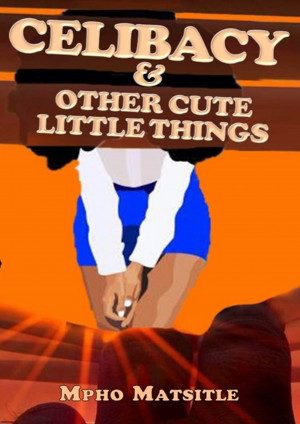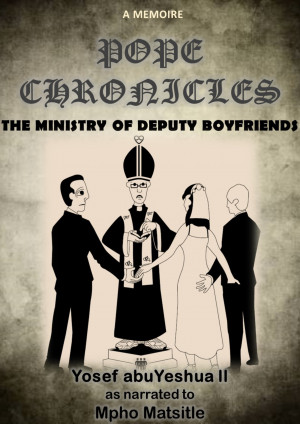Interview with Mpho Matsitle
Published 2016-09-22.
Describe your desk
Clean. Very minimalist. A lamp, laptop and mouse and sometimes a notebook if I happened to take notes to colour my lies with some facts. There is also always a 'Volkswagen Polokwane' drink coaster beneath the ever-present coffee mug - which is strange because I neither own a VW nor have been to Polokwane; I really don't know where I got it. So whenever I'm stuck I look to it to get the creative juices flowing.
Where did you grow up, and how did this influence your writing?
I grew up in Kanana, the township of the little known mining town Orkney (strangely enough it is still obscure even though it is one of the very few towns in the country to have a sitcom named after it.) Anyway being a mining town it was quite cosmopolitan; you had people from all over South Africa and neighboring countries living there. So we grew up hearing stories of the different places people came from. My father also happens to be one of the first residents of the township, so he too would regal us in stories of how the place came to be. So I have always been enthralled by stories of how people/place came to be, why they do the things they do, and these preoccupations come through in my writing.
When did you first start writing?
I started writing in the autumn of 2007, after overhearing a conversation between two girls talking about me – I was in behind them in a queue at a shop. They did not recognise me, I looked decidedly different from what I used to the previous year. Actually I don’t think they knew me, because I didn’t know them. They were probably just repeating stories they’d heard from other people. It was strange to me – I was the least popular person I knew. I was a bit of a recluse – still am really. Yet they spoke of me with so much authority as if they knew me; I learnt then that I was just an idea – we all are – that floated in people’s heads. So when I got home I wondered what else they and other people were saying about me – and other people. I wondered how their conversation went after they left the queue. So I picked up a paper and pen, and finished their conversation there. I imagined it was happening on MXit [an instant text messaging platform] – so I titled the story “MXit Conversations”. And I never stopped being curious of what people say and think since – given that I couldn’t exactly read their minds or eavesdrop, I wrote what I imagined they’d think or say in a given situation.
What motivated you to become an indie author?
To write what I like, and when I like. Also because the publishing industry in the country [South Africa] isn't really as open as one would like it to be; both in terms of ideas and accessibility.
What is the greatest joy of writing for you?
Being God! To create a whole universe where you are in control - bar a few ungovernable characters and story lines. Well, to be honest the ungovernable characters are what makes the whole thing exciting. So I guess that's it then; the greatest joy of writing is the wayward characters who just won't stick to the script.
What are you working on next?
A compilation of essays on the art scene in my current city, Bloemfontein, called "State Of Mangaung Arts", as well as polishing the manuscript to my novella "Kleva Tsa Westdene" - 'a brief look into how the much-envied, much-loathed, clever blacks define, defy and defile themselves'. I also intermittently work on my Setswana novels "Go Ojwa Ga Lona" and "Mothusi O Bone Lesea".
Who are your favorite authors?
Milan Kundera, Mbe Mbhele, Ngugi, Chimamanda Adichie
What inspires you to get out of bed each day?
Nothing. I hate getting out of bed. I think humans were designed to stay in bed all the time. All the best human experiences happen in bed.
When you're not writing, how do you spend your time?
Dying. I want to say reading but for me that's an integral part of writing. I also want to say listening to music but in my world the music is never off. I spend my time "away from writing" (if there's such a thing) on the everyday things, some banal some exciting, but all equally important. So none really deserving special mention. Except death. Its a bit of a big deal.
How do you discover the ebooks you read?
Google is my best friend. Pretty much like all the books I read - I have a burning question and I ask around who has the best answer to it and I go find that book. Or I am just in a mood to be amused and browse what's available on the different platforms.
What is your writing process?
A question. A word. A phrase. Whenever either of these stick to my head from somewhere (it could be something someone said or something from the many debates happening inside my head) I jot it down, and from there I flow. If I don't I quit. I usually write my short stories and essays in one go or never finish them. It does sometimes happen though that in the editing process I end up rewriting the whole thing.
What is your e-reading device of choice?
Kindle 6 - simple, no trickery.
Smashwords Interviews are created by the profiled author or publisher.
Books by This Author
Celibacy & Other Cute Little Things
by Mpho Matsitle
A short story anthology exploring tales of beauty of music of laughter of sex of love. Of the little pleasures of life; the minuscule moments that make human faces shine bright with wide smiles. Tales of friends of family of lovers of colleagues of comrades. These short tales are meant to excite the brain, to illicit smiles, to provoke laughter. In short; they are cute little things.
Pope Chronicles: The Ministry of Deputy Boyfriends
by Mpho Matsitle
A quirky and irreverent fictional memoire of Pope Emeritus of the Holy Alliance of Deputy Boyfriends, and an exploration and exaltation of his ministry. A tongue in cheek self-help manual to unburden men from the fear of being cuckolded through misappropriation of religious and political jargon and theories to tackles issues faced by the modern man in his amorous relationships.


